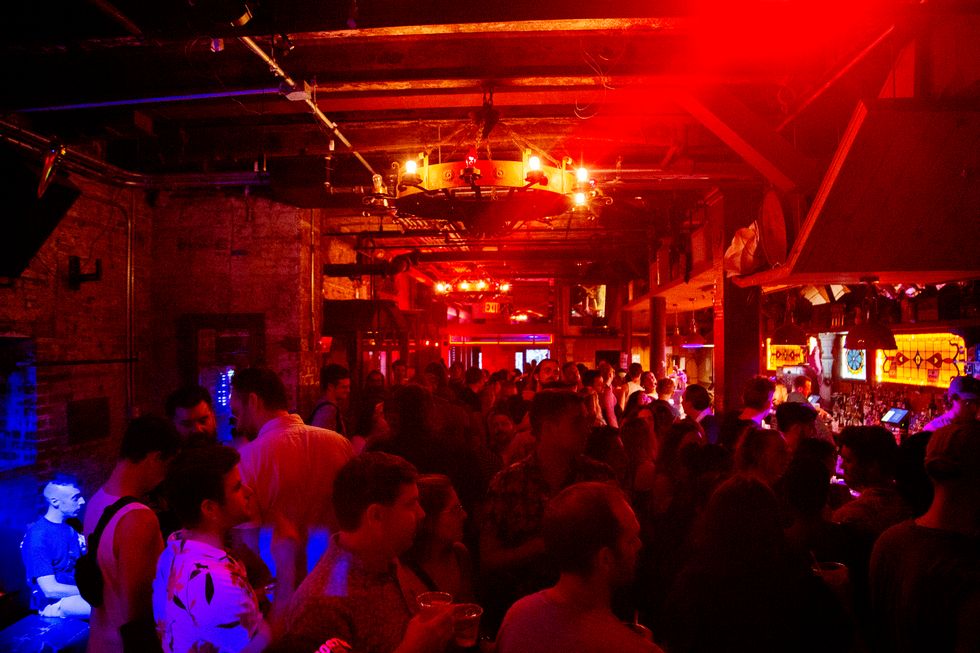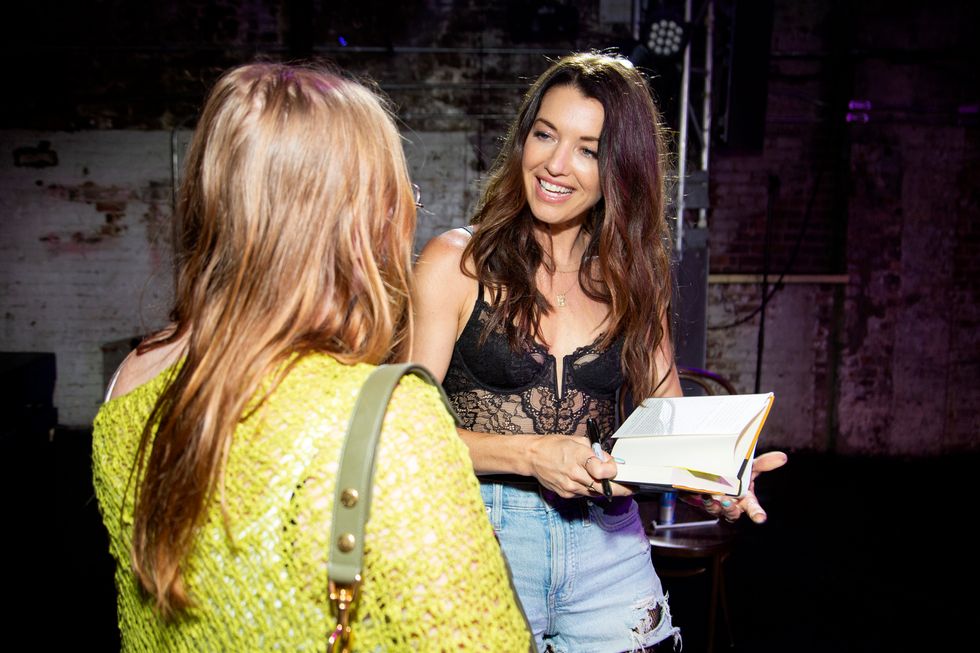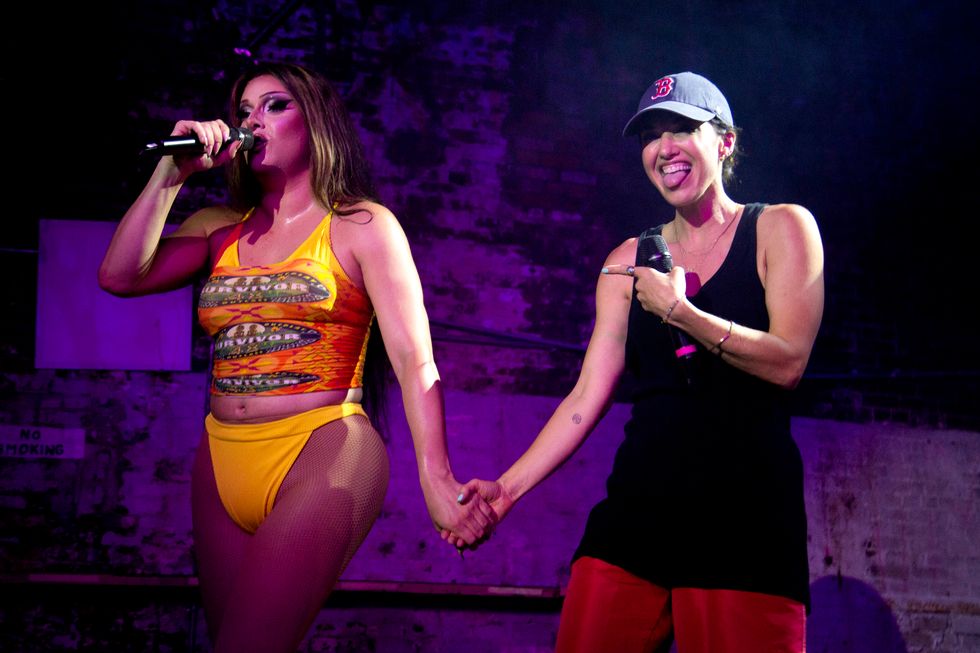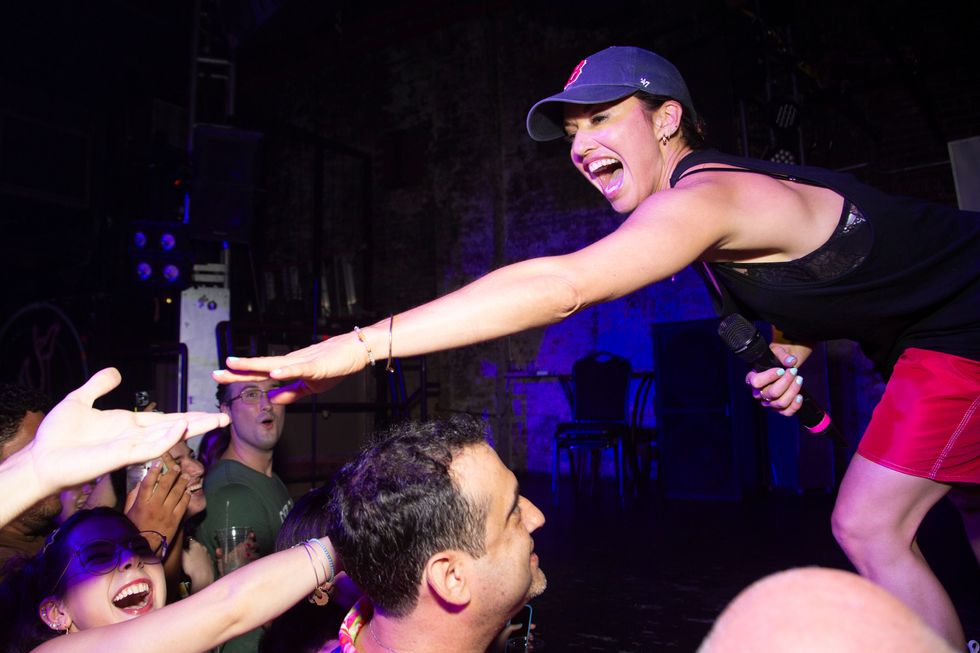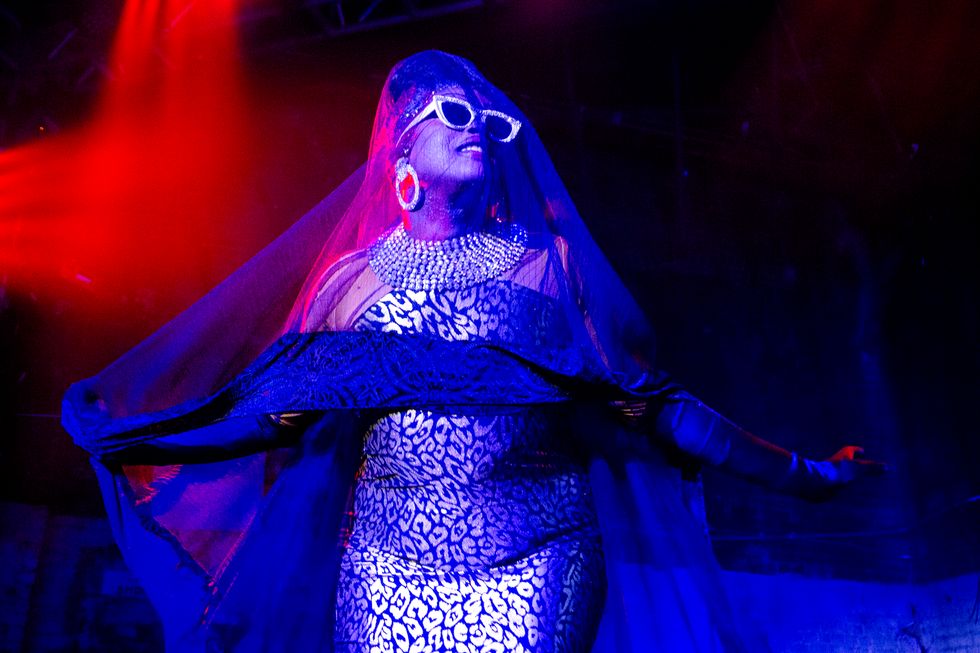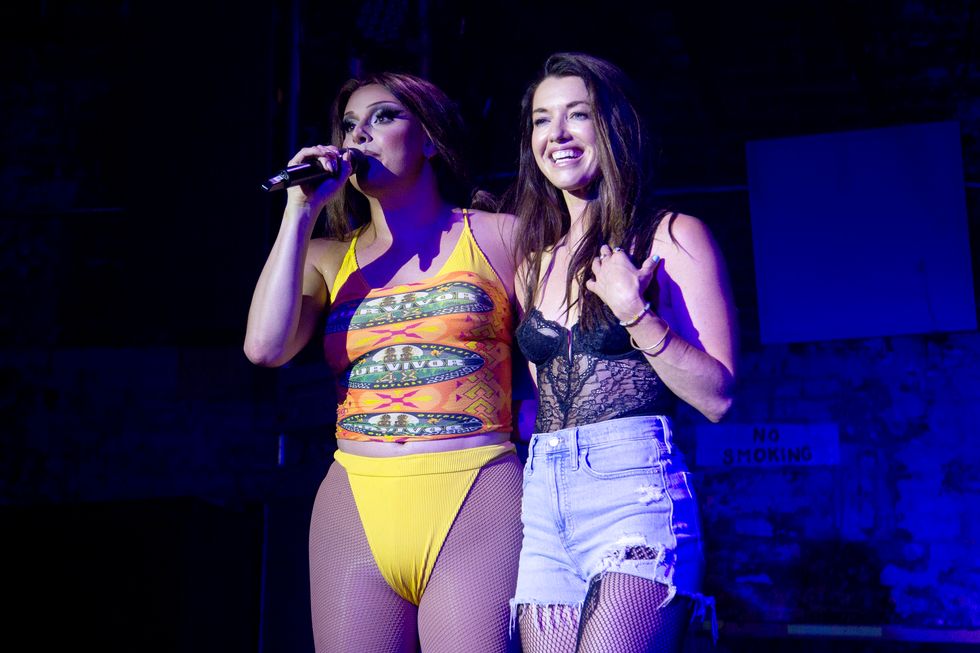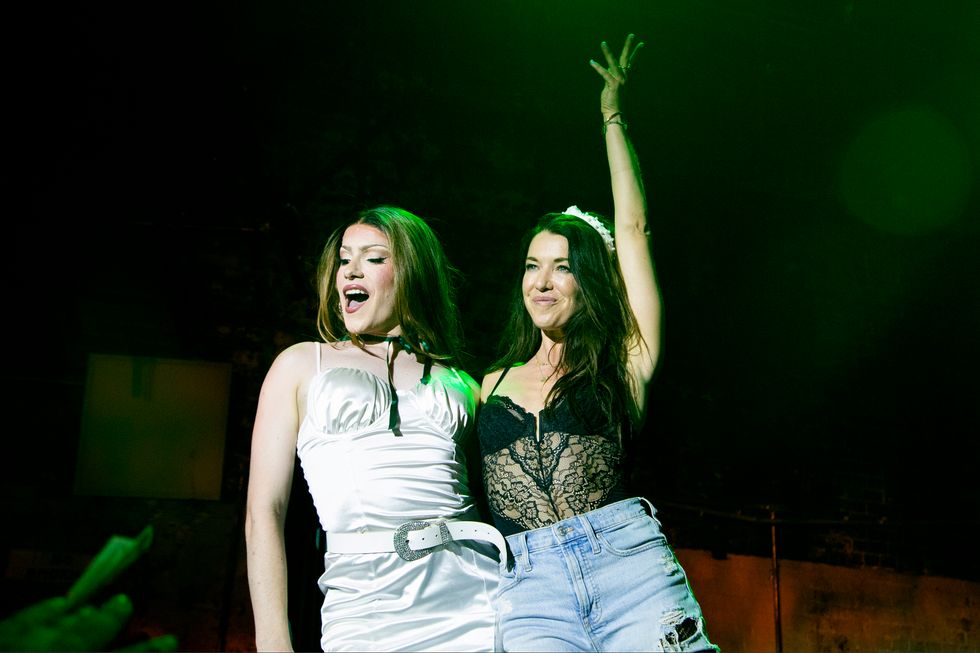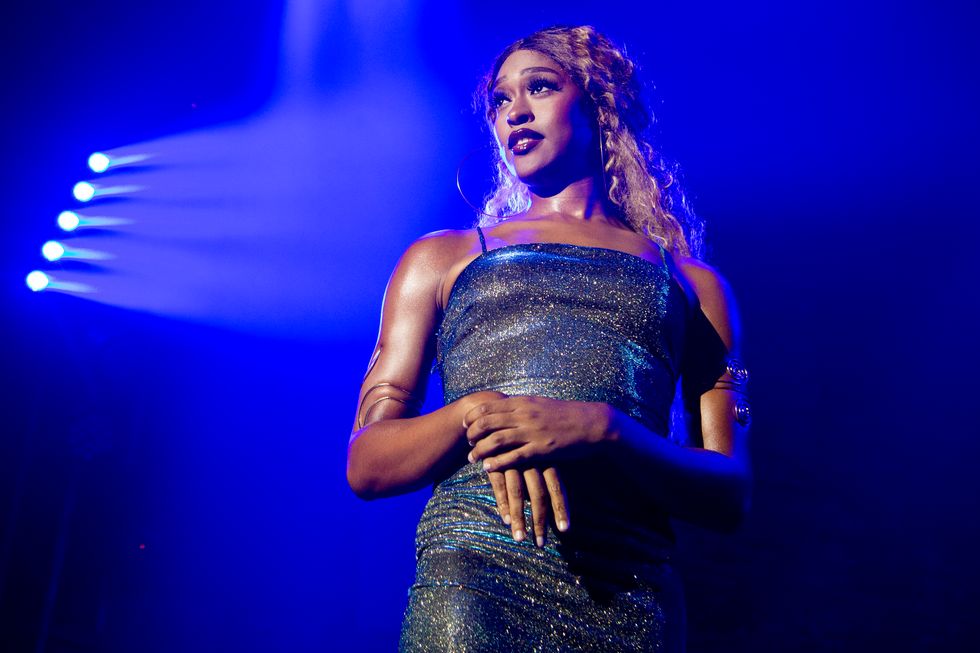
Parvati Shallow, Queen of Queer Brooklyn
By Tobias Hess
Jul 16, 2025The streets of Bushwick are abuzz with excited whispers. A new star is coming to 3 Dollar Bill and giddy gays of all stripes are beginning to pile into the venue on a humid summer evening.
No, Charli xcx hasn’t just announced a surprise pop up show. This group of fans are here to see none other than reality competition icon and PAPER star Parvati Shallow, who is launching her new memoir, Nice Girls Don’t Win, with a star-studded Survivor and The Traitors-themed drag show.
The last time PAPER saw Shallow, she and former Survivor cast mate Natalie Bolton, were bikini-clad and doused in mud for their chic photoshoot. Shallow was at the peak of her TV resurgence, celebrating her triumphant run as a traitor on the Peacock reality show of the same name. Her PAPER feature, which happened soon after she announced her queer relationship with comedian Mae Martin, broke the internet and helped fuel a much needed reappraisal of the feminist trailblazer’s time on reality TV.Not that her die-hard followers needed that reassessment. To Survivor fans, Shallow might as well be Beyoncé. Competing on four seasons of the show, Shallow made a name for herself as one of the show’s most cunning and savvy operators. After winning with an all-female alliance, the “black widow brigade,” on 2008’s Survivor: Micronesia, Shallow became a cultural lightning rod. Many fans were in awe of how she deployed flirtation and that 1000-watt smile to stunning effect, while others piled on her in a barrage of “slut-shaming,” turning what should have been a celebratory moment for the young winner into one that was rife with pain.
Thankfully, times have changed. “Being on reality TV is so much more fun now than it was before [in 2008], when it was just Perez Hilton and Us Weekly,” Shallow shares with PAPER. “People have a different relationship with gameplay and competition. There's more of an acceptance and celebration of villains in this era,” she says with a smile.
A lot more has changed for Shallow than just a shifting culture of reality TV, though. Now, nearly two decades after first appearing on Survivor, Shallow has gone through marriage, divorce, the birth of her daughter, the tragic loss of her brother, the discovery of her queerness and even more all-time runs on reality competition shows. And she is ready to reflect on it all and provide some lessons in the process.
Nice Girls Don’t Win: How I Burned It All Down To Claim My Power is an “embodied” account of how Shallow has navigated her singular path. “[The book starts with me as] a kid developing survival strategies,” Shallow tells PAPER, referring to her childhood growing up on a fraught, high-control spiritual commune in Florida that her family left when she was nine. “[Those strategies were] really helpful in my life. I later monetized them, going off and playing Survivor. [But] then I got to a point in my life where [those strategies] stopped working,” she shares. “Those strategies that helped me so much weren't helping me anymore.”
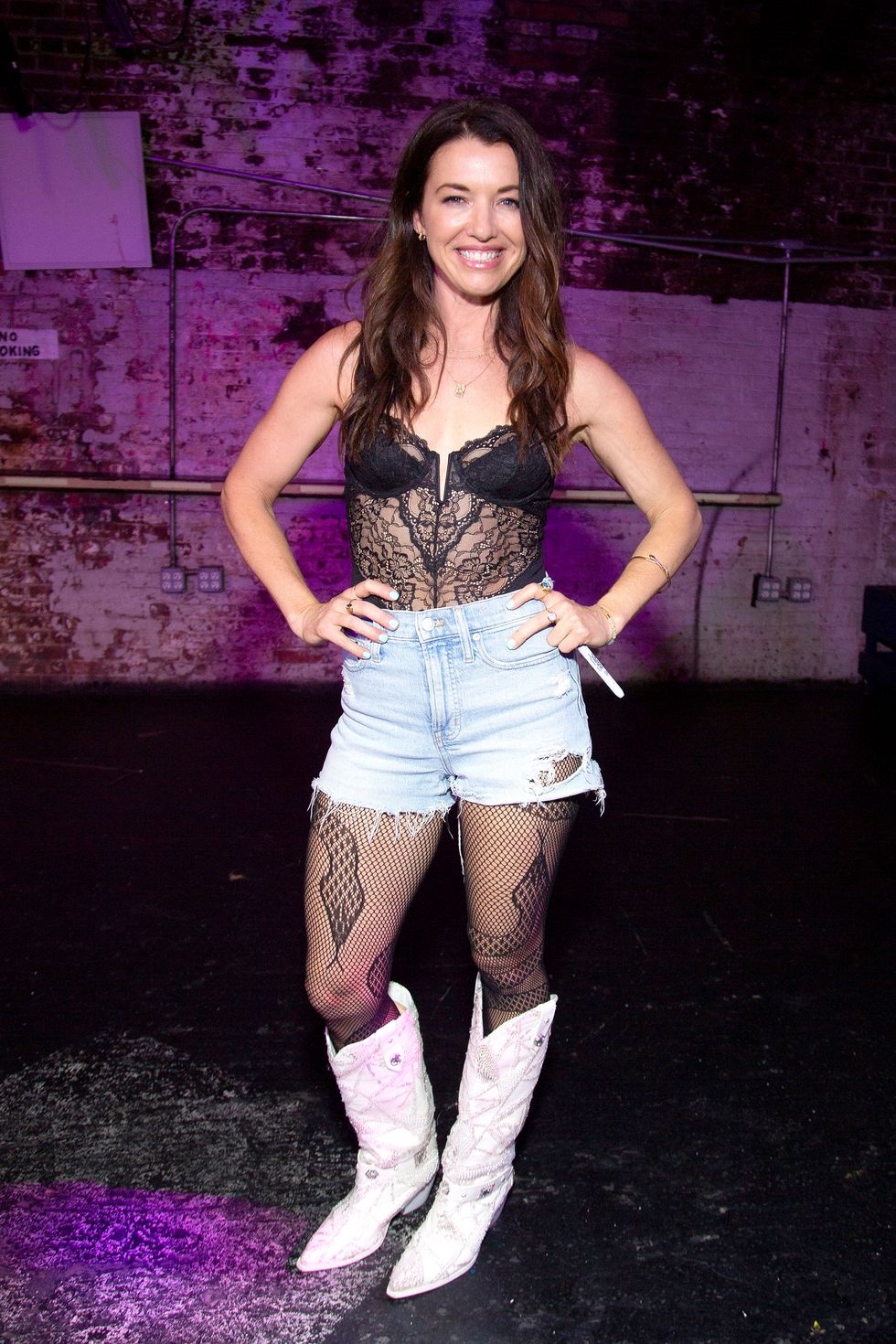
There is plenty in the book for any longtime fan of Shallow (though less Survivor tea than one would expect, due to CBS requesting many details be cut, Shallow shares). But also there are tidbits of wisdom for anyone looking to glean some lessons from someone who has found power amidst impossible pain.
It’s clear that Shallow’s many longtime fans are eager to attend the Shallow school of healing. The line for her meet-and-greet and book signing snakes throughout the entire large venue. And when it’s time for the drag show to start and Shallow comes out as Boston Rob-dressed drag king alongside Drag Race star Jan Sport (who’s singing “Shallow” of course), the crowd loses its collective mind.
Chatting with Jan Sport backstage, the famed drag queen shares why she, like the scores of fans in attendance, is also obsessed with Shallow. “I have always had a fascination with how women play games,” says Jan. “With men, there's power that goes into it, but with women there's power and finesse in a beautiful way. Parvati has the power of attacking, but also the finesse of knowing when to pull back and to strategize.”
Soon, fans will all be able to see Shallow back on their screens in a special season of Australian Survivor, Australian Survivor: Australia V The World, where Shallow will reunite with her one-time Survivor alliance member and “Survivor soulmate,” Cirie Fields, alongside a global cast of all-stars. When asked about her experience on the forthcoming show, Shallow smiles: “I feel very complete with my Survivor journey. I feel all set.”
We’ll try to stay calm and not read too much into that. In the meantime, PAPER chatted with Shallow for a memorable second time to talk about writing this buzzy new memoir, her long road through reality TV and navigating loss and new chapters.
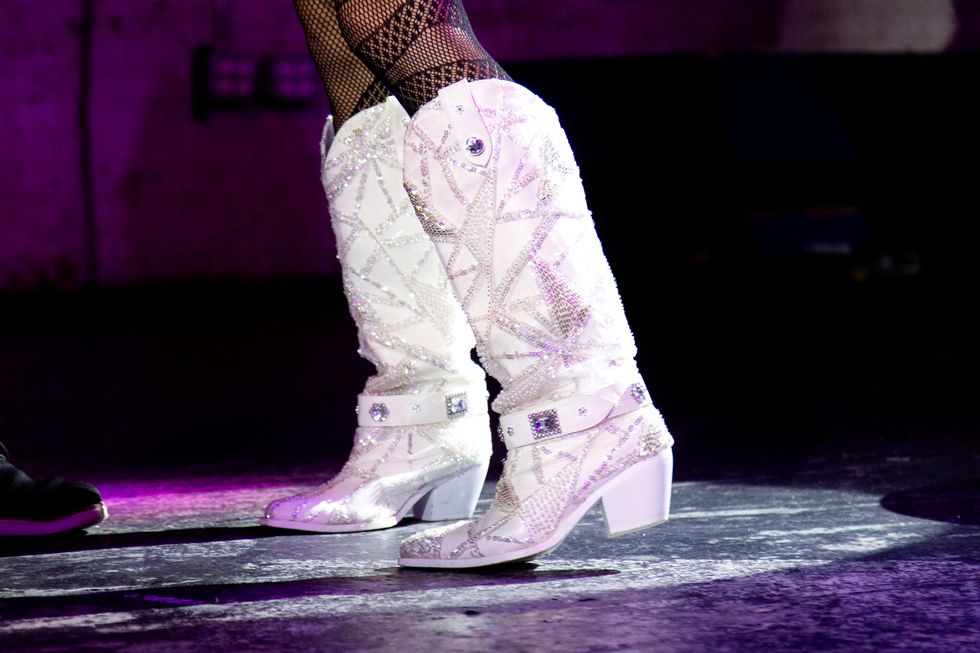
How has your experience thus far been talking about the book? You go through this crazy experience of writing the book, which is, I'm sure, psychedelic, and now you're talking about it ad nauseum.
Well, one of the reasons why I wrote the book is because I wanted to tell my stories in my own words. As soon as I stepped on to reality TV other people have been telling my story. And then fans have been telling whatever story [about me] that they make up from watching me on TV.
This book is really the culmination of three years of soul searching and investigating my life and myself so that I could lay it out in a structure that would be really helpful for me to understand why and how I make the choices that I make in my life.
My other intention with the book is to offer emotional support for readers. The way that I wrote the book is really embodied. I want readers to be able to feel it in their own bodies as they're reading it, and attune to the stories and say, “Oh, I do that.” Or I want people to think about their own lives when they're reading the book, so that they can see some ways that they get in their own way.
I take readers from start to finish. [It starts with me as] a kid developing survival strategies that are really helpful in my life that I later monetize, going off and playing Survivor. And then I get to a point in my life where [those strategies] stop working. Those strategies that helped me so much weren't helping me anymore. That was a whole breakdown in my life. And so I had to examine that and then transform. My whole operating system had to get an upgrade. So I take readers on that whole journey as I get out on the other side.
I want people to know it's possible for them. That's all I wanted when I was getting divorced. I was like, I need people to tell me that there's another side, right? I am completely and totally firmly planted on the other side of that very difficult situation. So whatever hard thing that anyone is facing, you can get through it. And you can always start over. I wanted to really land that message, because I think a lot of people are afraid of starting over. They're like, “I'm too old,” but it's never too late to start over.You talk a lot throughout the book about your somatic bodily practices. What was the somatic experience of writing the book?
I went through every emotion and every feeling. It was a process. Writing about the death of my brother and his accident was really hard. I was really kind to myself. I kept doing all the body work. I would take long walks. I just gave myself a lot of comfort and care as I was writing the hard stuff and it helped me to move through it so I could sit down and feel all that stuff and be like, “I'm safe. I'm okay. It's okay to feel this and write it out.”
And I was working with a writing coach who I would read the stories to. I would cry on Zoom while I was reading the story to her, and then we would edit it together, and slowly the story left my body and it transferred onto the page. So now I can speak about these really hard things in my life without fear. I have more lightness in my body from having processed all of those hard things through writing.
I know you hadn't talked, or even processed that, much about your childhood in a spiritual commune prior to writing this book. What was it like revisiting those memories? Did you find that they came back clear after some reflection?
There is a glow screen on my memory. It's a mercy function of my brain, and we all have that. It helps us to survive really crazy stuff. My childhood must have been wildly disorganizing internally. It looked beautiful on the outside, and everyone's devoted to this guru, and they're all worshiping her, but she's hurting them. And they're pretending like it's okay that she's hurting them, and they're continuing to worship her and giving her all their money and their attention and their love. So for me as a kid, I'm like, “Well, this is life, right?” So life goes on and I never even processed any of that until very recently. Going to a therapist taught me to see that I was raised in a pretty extreme environment. I thought it was just a ranch [laughs]. But we just do that. We put that glow screen over some stuff. It's why women give birth more than once. We get amnesia.
The Survivor chapters were surprisingly sparse. I was curious if that was also a function of your trauma from the show creating a certain glow screen in your memory?
The Survivor chapters were more fleshed out. There was more detail, but I had a situation with CBS where I had to adjust [those chapters]. It was right before the book came out. It was really disappointing for me. I have a good relationship with them. I've given them so much, and I was really excited to share the book with [Survivor host] Jeff [Probst] and with CBS. And the response was not what I expected.
Do you think it was just about control for them, that CBS needs to keep a lid on everything?
It was really hard to understand some of the reasons why they wanted certain things removed. There was no through line.
Does that relationship feel really compromised?
My goal was to maintain the integrity of the book and to put out a book that was true to me, and also kept the relationship intact. I don't need to have any kind of ill will with anybody. I just feel like it has put a period at the end of a chapter with myself and Survivor.
With American Survivor, right? We still have your stint on Australian Survivor coming.
Yes, we've got Australian Survivor coming. It's gonna be pretty fun.
In contrast, The Traitors section is very fleshed out.
I really enjoy my experience with Peacock, The Traitors and that production company. They took really good care of us. I felt cared for and valued. That was really nice, because, as a contestant on these shows, we're really putting ourselves to the wolves. To have a network and production company see that and value us for the courage and energy that we're giving feels really nice. It feels like a symbiotic relationship.
How did your experience on the forthcoming season of Australian Survivor fit into your journey through all these shows?
I feel very complete with my Survivor journey. I feel all set. [Smiles and laughs].
Okay, good! I'm not going to try and read too much into that …
Don't read into it. There's nothing to read into, but I'm excited for people to watch Australian Survivor. It was super fun. It felt like a celebration with all these international players, and the team that was producing the show was very excited. Some of the producers were supposed to be off, but they flew in just to produce our season because they were excited for the contestants and this kind of very cool worldwide showdown. So to me, regardless of how I place on the show, this is the capstone of my time on Survivor.
It's kind of what Season 40 of Survivor should have been.
40 was really bad [laughs]. It also was the time of my life. I just had a baby, and that's just no time to be doing Survivor.
How was it being back with Cirie Fields [who famously competed with Parvati on Survivor: Micronesia] on Australian Survivor?
Cirie has my heart. I call her my Survivor soul mate. We just get each other. There is something about what we are able to do together that is beyond the realm of what should occur on reality TV. We're greater than the sum of our parts, and we can make magic happen.
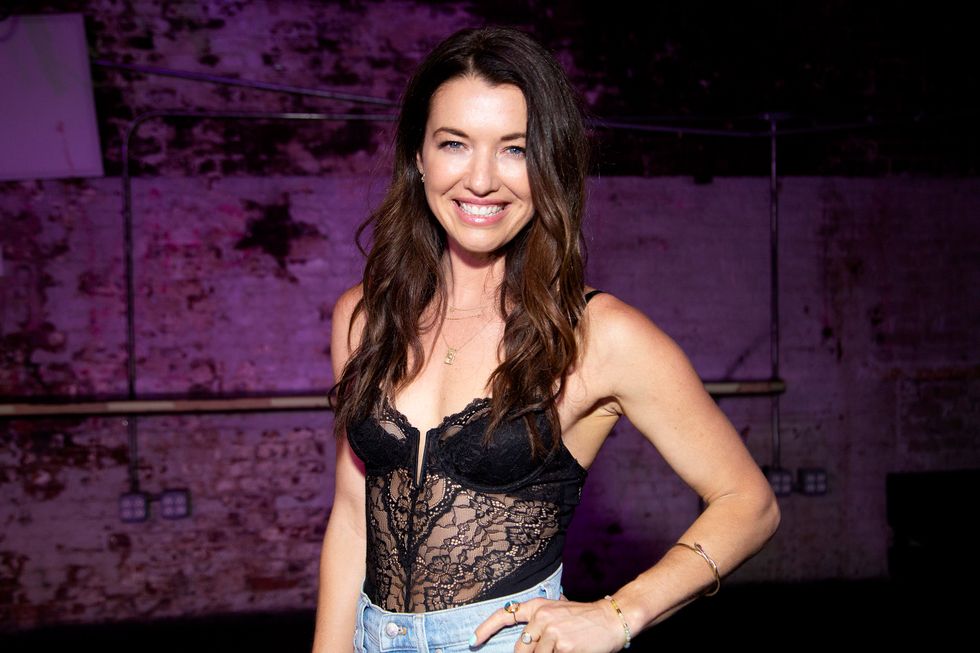
I was really struck by your openness and detail in terms of writing about some really difficult experiences, be it with your brother or your ex husband. How was it navigating sharing your story that also involved others and people who are close to you?
I did my best to keep the material focused on myself and my feelings and my process around my feelings. I don't need to go in and tell other people's personal stories. I did my best to share specific stories that I felt were relevant to the point that I was making in the chapter, or where I was moving the reader from where the book began to where I wanted it to end. Some of these topics are really sensitive, right? I still have a relationship with my ex, my daughter's dad, we co-parent, and I have worked really hard to get that to a good place. I would like to keep it that way. Doing my best [laughs].
You also talk about your relationship with Mae. Was that something that you had to check in on? It's a joyous story, but also it's a personal story … and sexual.
Very personal. Very vulnerable. I wrote a scene [where I use a strap on], and I immediately sent it to Mae, because I loved the scene, but I was like, “How do you feel about
this if I put it in my book?” Mae was like [cringes], but Mae knows my story and was very supportive.
I think it was important to include, especially given how sexuality has played in your entire public arc.
[My relationship with Mae] and the playfulness was super healing. And I want other people to have that permission for themselves too, to break out of the box and be more playful with themselves in the bedroom. It’s like an adult playground.
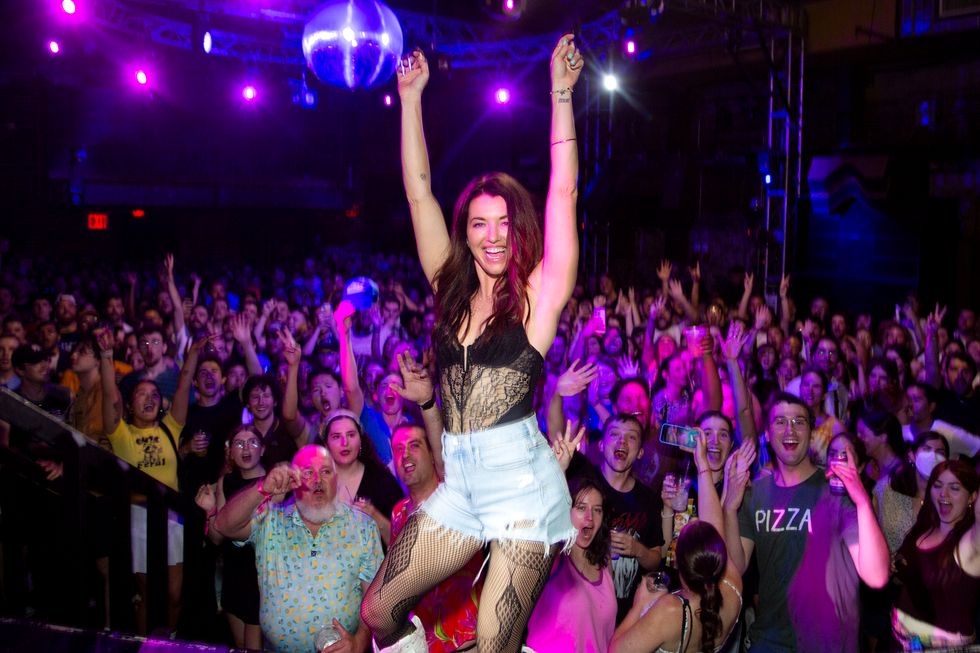
The chapter about your brother really touched me. Now that this is something that you're more publicly speaking about part of your story, I'm curious if you have a hope for how it reaches people, or maybe what you were looking for while you were personally navigating your brother’s addiction that you didn't feel like you had access to at the time?
We had no help or the help that we got was really unhelpful. It was old school intervention-style help. Now there's a lot more resources available, but it's still a really tricky disease. [Addiction is] a whole systemic issue within a family unit or within a unit of community, because usually other people around the addict are propping up the addiction with their own kind of enabling or codependent or avoidant behavior. So everyone has to look at themselves.
My tendency was a savior/fixer complex, so I had to look at that for myself and stop doing that. And so my work became about trustful surrender and honoring the relationship and having boundaries to maintain my health and the well being of my daughter, while also loving my brother to the capacity that I was able to when he was in active addiction.
Al-Anon was super helpful for me. It's an isolating experience, so it's helpful to share these kinds of stories so that people realize they’re not alone. And it's a really helpful thing to reach out and join a support group or ask for help, or become a member of a community where you can talk about stuff that's hard that you have no real solution for.
If I could have waved a magic wand and cured my brother from addiction and saved his life, I would have done it. But I felt very powerless and helpless in my position in relation to his addiction. That's just really hard for people to wrap their heads around if they're struggling with [this kind of situation] too.
It's so amazing seeing the expansion of your career. You've done all these shows. You're on this giant press tour with this book. I'm curious if you have a specific idea in mind for what this chapter of your life will blossom into?
I feel very complete with my reign on competitive reality television [laughs]. It feels complete. Now I'm stepping into a new era of creative development. I'm working on developing shows, pitching shows I'll be hosting, so you'll see me on TV in a different role. I want to be curating the experience for the contestants and supporting them in playing our best game. And I have a couple of projects that I'm actively pursuing now.Photography: Santiago Felipe
From Your Site Articles
- Parvati Proves Nice Girls Don't Win ›
- You Must See Parvati Shallow on 'Survivor: Australia V The World' - PAPER Magazine ›
- Reliving 'Big Brother' Star Rachel Reilly's Most Iconic Feud - PAPER Magazine ›
- 'The Traitors' Monét X Change Declares War on 'Real Housewives' - PAPER Magazine ›
Related Articles Around the Web
MORE ON PAPER
ATF Story
Madison Beer, Her Way
Photography by Davis Bates / Story by Alaska Riley
Photography by Davis Bates / Story by Alaska Riley
16 January
Entertainment
Cynthia Erivo in Full Bloom
Photography by David LaChapelle / Story by Joan Summers / Styling by Jason Bolden / Makeup by Joanna Simkim / Nails by Shea Osei
Photography by David LaChapelle / Story by Joan Summers / Styling by Jason Bolden / Makeup by Joanna Simkim / Nails by Shea Osei
01 December
Entertainment
Rami Malek Is Certifiably Unserious
Story by Joan Summers / Photography by Adam Powell
Story by Joan Summers / Photography by Adam Powell
14 November
Music
Janelle Monáe, HalloQueen
Story by Ivan Guzman / Photography by Pol Kurucz/ Styling by Alexandra Mandelkorn/ Hair by Nikki Nelms/ Makeup by Sasha Glasser/ Nails by Juan Alvear/ Set design by Krystall Schott
Story by Ivan Guzman / Photography by Pol Kurucz/ Styling by Alexandra Mandelkorn/ Hair by Nikki Nelms/ Makeup by Sasha Glasser/ Nails by Juan Alvear/ Set design by Krystall Schott
27 October
Music
You Don’t Move Cardi B
Story by Erica Campbell / Photography by Jora Frantzis / Styling by Kollin Carter/ Hair by Tokyo Stylez/ Makeup by Erika LaPearl/ Nails by Coca Nguyen/ Set design by Allegra Peyton
Story by Erica Campbell / Photography by Jora Frantzis / Styling by Kollin Carter/ Hair by Tokyo Stylez/ Makeup by Erika LaPearl/ Nails by Coca Nguyen/ Set design by Allegra Peyton
14 October
